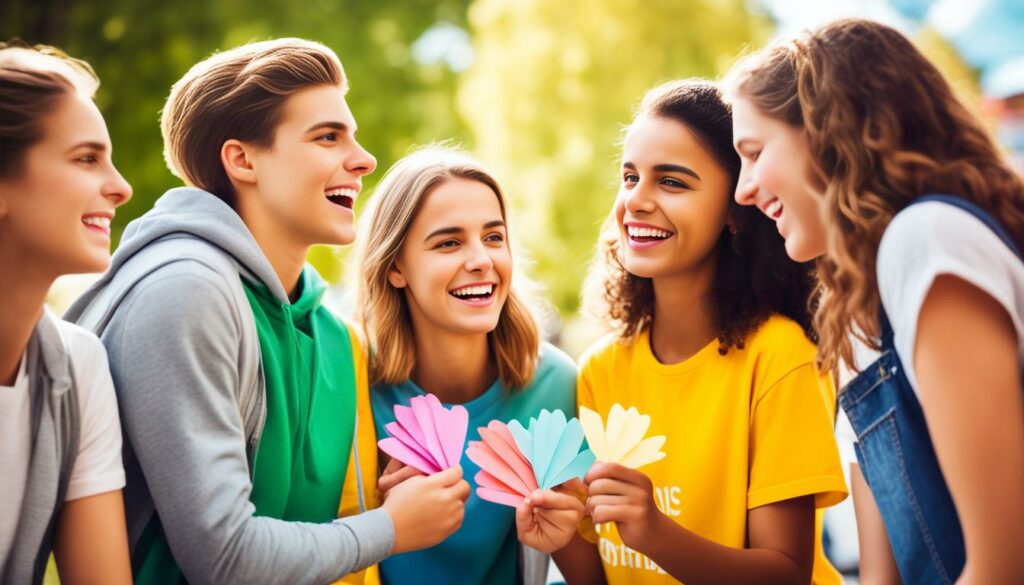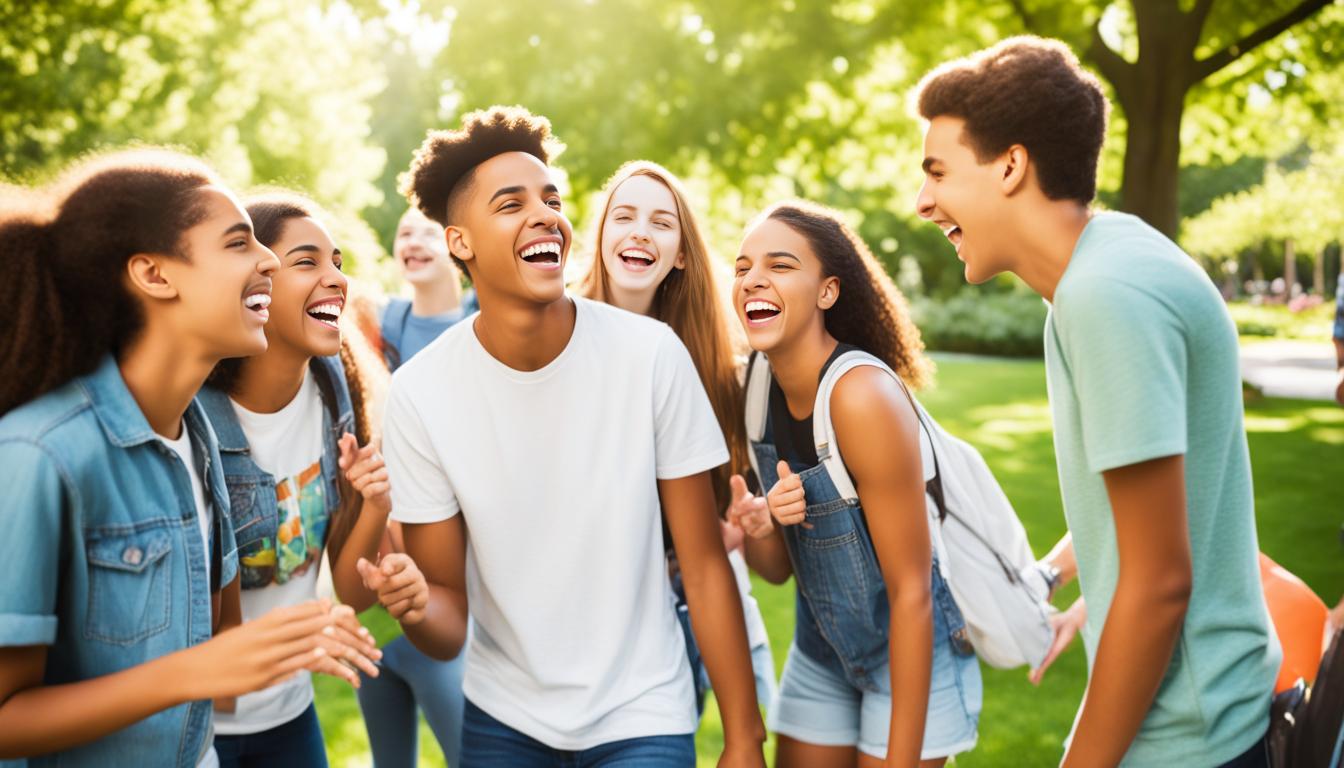Win Friends & Influence People – Teen Guide
Are you a teenager looking to build strong relationships and positively influence those around you? Look no further than “How to Win Friends and Influence People for Teen Girls” by Donna Dale Carnegie. This exceptional book offers valuable advice tailored specifically for modern teenagers, providing guidance on how to navigate the complexities of human relationships.
In today’s fast-paced world, it’s crucial for teenagers to understand the importance of empathy, effective communication, self-confidence, and conflict resolution. These skills are the foundation for building and maintaining meaningful relationships throughout life. “How to Win Friends and Influence People for Teen Girls” offers practical techniques and insights to help teenagers develop these vital social skills.
Key Takeaways:
- Empathy and kindness are essential in building meaningful relationships.
- Effective communication is the key to positive interactions with others.
- Self-confidence and self-awareness contribute to social success.
- Navigating peer pressure and conflict is crucial for maintaining personal values.
- Constructive criticism can foster personal growth and improvement.
The Power of Empathy and Kindness

Building meaningful relationships is essential for teenagers navigating their social lives. One key aspect emphasized in the book “How to Win Friends and Influence People for Teen Girls” is the power of empathy and kindness. Developing strong social skills for teenagers involves connecting with peers and positively influencing them. By practicing empathy, teenagers can establish a deep understanding of others, foster genuine connections, and create a harmonious social environment.
The book encourages teenagers to actively listen to others, demonstrating genuine interest in their lives and perspectives. By showing empathy, teenagers can put themselves in their peers’ shoes, fostering a deeper understanding of their emotions and experiences. This understanding allows teenagers to form strong bonds with their peers, strengthening relationships and creating a positive influence.
“Empathy is about understanding the feelings of others, sharing their emotions, and creating a safe and supportive space,” explains author Donna Dale Carnegie. “When we show empathy, we let others know that they are seen, heard, and valued.”
“Empathy is the bridge that connects hearts and minds. As teenagers, it is valuable to embrace empathy and kindness in our daily interactions. By doing so, we lay the foundation for lasting relationships and positively impact those around us.”
Teaching teenagers the importance of empathy and kindness not only improves their relationships but also enhances their social experiences. By incorporating these skills into their lives, teenagers will find that they are able to connect with their peers on a deeper level, influence them positively, and create a supportive community.
Practical Strategies for Fostering Empathy:
- Practice active listening and offer support when peers share their thoughts and feelings.
- Show genuine interest in others, asking open-ended questions to encourage them to share more about themselves.
- Understand and respect differing perspectives, recognizing that everyone experiences the world differently.
- Be kind and caring towards others, demonstrating compassion and empathy in daily interactions.
Effective Communication for Positive Relationships

The book “How to Win Friends and Influence People for Teen Girls” emphasizes the importance of effective communication for building successful relationships. Learning effective communication skills is essential for teenagers as it allows them to express themselves clearly and confidently, make a good first impression, and handle difficult conversations. By honing their communication skills, teenagers can enhance their personal and professional interactions and establish positive relationships with others.
The Power of Clear and Confident Expression
One of the key aspects of effective communication is the ability to express oneself clearly and confidently. Teenagers often struggle with articulating their thoughts and feelings, which can hinder their ability to connect with others. The book offers practical techniques to help teenagers improve their communication skills, such as:
- Using simple and concise language to convey their message effectively
- Practicing active listening to understand and respond empathetically to others
- Avoiding interrupting or dominating conversations, allowing others to express themselves
Making a Good First Impression
First impressions play a crucial role in building relationships, and teenagers often find themselves in situations where they need to make a positive impact quickly. The book provides guidance on how teenagers can make a good first impression by:
- Paying attention to their appearance and grooming
- Displaying good body language, such as making eye contact and having an open posture
- Showing genuine interest in others and engaging in meaningful conversations
Handling Difficult Conversations
Difficult conversations are inevitable in relationships, and knowing how to navigate them is essential for maintaining positive connections. The book equips teenagers with strategies to handle difficult conversations effectively, including:
“When faced with a difficult conversation, it’s important to approach it with empathy and understanding. Listen actively, acknowledge the other person’s feelings, and express your thoughts calmly and respectfully. By striving for a win-win outcome and finding common ground, you can foster a positive resolution.”
By improving their teenage communication skills and implementing the practical tips provided by the book, teenagers can become better communicators, positively influence others, and build strong and meaningful relationships.
Building Self-Confidence and Self-Awareness

One crucial aspect of building successful relationships is developing self-confidence and self-awareness. The book “How to Win Friends and Influence People for Teen Girls” provides invaluable guidance in this area. By helping teenagers embrace their uniqueness, develop a positive self-image, and build confidence in their abilities, the book equips them to present themselves authentically and confidently in their relationships and interactions with others.
Understanding one’s strengths and weaknesses is a fundamental step toward building self-confidence. By acknowledging their talents and areas for growth, teenagers can harness their strengths and work on improving their weaknesses. It empowers them to navigate social situations with self-assurance and demonstrate genuine authenticity to others.
Additionally, the book emphasizes the importance of self-awareness in fostering positive relationships. By being self-aware, teenagers can recognize how their actions and words affect others, resulting in improved communication and an enhanced understanding of others’ needs and emotions. Self-awareness enables teenagers to navigate their relationships with empathy and sensitivity, thereby strengthening their social bonds.
“Embracing their uniqueness and developing self-confidence allows teenagers to present themselves authentically and confidently in their relationships with others.”
Self-confidence and self-awareness are intrinsically linked. When teenagers have a strong sense of self and believe in their abilities, they can engage in relationships without fear or hesitation. This confidence enables them to express their thoughts and feelings openly, assert their boundaries, and establish healthy connections based on mutual respect.
The book encourages teenagers to practice self-care and engage in activities that nurture their passion and interests. By investing time and effort in self-development, teenagers can cultivate a sense of fulfillment and boost their self-esteem. This, in turn, positively impacts their relationships by contributing to their overall happiness and well-being.
To summarize, building self-confidence and self-awareness is key to achieving social success as a teenager. By embracing their uniqueness, understanding their strengths and weaknesses, and cultivating a positive self-image, teenagers can present themselves authentically and confidently in their relationships. The book “How to Win Friends and Influence People for Teen Girls” serves as a valuable guide in helping teenagers navigate the intricacies of building strong and meaningful connections.
Strategies for Building Self-Confidence and Self-Awareness
| Strategies | Benefits |
|---|---|
| Embrace uniqueness | Presenting oneself authentically |
| Recognize strengths and weaknesses | Building self-confidence through self-improvement |
| Cultivate self-awareness | Fostering empathy and understanding in relationships |
| Practice self-care | Boosting self-esteem and overall well-being |
Navigating Peer Pressure and Conflict
The teenage years can be challenging when it comes to building relationships and influencing peers positively. The pressures of fitting in and the conflicts that arise can often feel overwhelming. However, with the right guidance and tools, teenagers can navigate peer pressure and handle conflicts effectively, staying true to their own values and beliefs.
One key aspect highlighted in the book is the importance of standing up for oneself. It encourages teenagers to assert their boundaries and make choices that align with their values, even if it means going against the crowd. By doing so, teenagers can build self-respect and earn the respect of others.
Resolving conflicts is another crucial skill emphasized in the book. It provides practical advice on effective communication, active listening, and problem-solving techniques. By learning to address conflicts constructively and seek mutual understanding, teenagers can build healthier relationships and prevent potential damage to their social connections.
“When conflicts arise, it’s essential to stay calm and empathetic,” advises Donna Dale Carnegie, the author of the book. “Listen actively to the other person’s point of view and find common ground for resolution. By approaching conflicts with empathy and respect, teenagers can diffuse tense situations and maintain positive relationships.”
Ultimately, the book’s guidance equips teenagers with the necessary tools to navigate peer pressure and conflict. By staying true to themselves and communicating effectively, they can make better choices, build healthy relationships, and ensure their own well-being.
Key Takeaways:
- Teenagers should stand up for themselves and make choices aligned with their values.
- Effective communication and active listening are vital in resolving conflicts.
- Approaching conflict with empathy and respect helps maintain positive relationships.
The Need for Constructive Criticism

Constructive criticism plays a vital role in teenage communication skills and social success for teens. The book stresses the significance of distinguishing between judgments or stereotypes and constructive criticism that stems from genuine goodwill.
“Constructive criticism is an opportunity for growth and improvement.”
By choosing their words carefully and providing constructive feedback, teenagers can avoid damaging relationships and instead foster personal growth and improvement. Constructive criticism allows them to address areas of improvement without causing harm or resentment.
| Benefits of Constructive Criticism | Effective Communication Tips |
|---|---|
|
|
Constructive criticism, when delivered with empathy and respect, strengthens relationships by fostering open communication. It allows teenagers to navigate conflicts and challenges while maintaining a positive and supportive social environment.
To illustrate the significance of constructive criticism, consider the following scenario:
Scenario: Helping a Friend Improve Public Speaking Skills
- Stephanie, an outgoing teenager, has been struggling with public speaking.
- As a supportive friend, Emma provides constructive criticism by praising Stephanie’s confidence but suggesting areas of improvement.
- Emma recommends practicing in front of a mirror, joining a public speaking club, and using positive self-talk to boost Stephanie’s confidence.
- Stephanie appreciates Emma’s feedback and actively works on enhancing her public speaking skills.
- Over time, Stephanie’s improvement is noticeable, and she feels more confident in expressing herself.
By understanding the importance of constructive criticism, teenagers can successfully navigate the complexities of relationships and communication, fostering personal growth, and creating a supportive and inclusive social environment.
Cultivating a Positive Outlook
In today’s fast-paced world, cultivating a positive outlook is crucial for teenage communication skills and social success. According to the book “How to Win Friends and Influence People for Teen Girls” by Donna Dale Carnegie, adopting a positive mindset can have a profound impact on relationships and overall well-being.
Instead of focusing on criticism, teenagers are encouraged to shift their attention towards praise. Acknowledging the strengths and achievements of others fosters a supportive and uplifting environment, fostering stronger connections and friendships.
Emotional sensitivity is another key aspect emphasized in the book. By being aware of and considering other people’s feelings and perspectives, teenagers can develop empathy and establish rapport with their peers. This skill helps create a deeper understanding and connection within relationships.
Tolerance and optimism are also vital traits for cultivating a positive outlook. The book advises teenagers to embrace differences, respect diverse opinions, and approach challenges with an optimistic mindset. By doing so, they can foster an inclusive and harmonious social environment that encourages growth and personal development.
“When you create a positive environment, you attract positivity. Positivity leads to stronger relationships and increased social success.” – Donna Dale Carnegie
By cultivating a positive outlook, teenagers can enhance their teenage communication skills and pave the way for social success. It not only strengthens existing relationships but also helps build new connections based on trust, understanding, and mutual support.
| Benefits of Cultivating a Positive Outlook |
|---|
| 1. Enhanced empathy and understanding |
| 2. Strengthened friendships and relationships |
| 3. Fostered inclusivity and respect |
| 4. Improved emotional well-being |
| 5. Increased social success and influence |
Developing Leadership Skills
Building strong leadership skills is a crucial aspect of winning friends and influencing people, especially for teenagers. The book “How to Win Friends and Influence People for Teen Girls” provides valuable guidance on how teens can become influential leaders and positively impact their peers and communities.
One of the key lessons emphasized in the book is the importance of being a good person and a leader whom others respect. By embodying qualities such as empathy, effective communication, self-confidence, and conflict resolution, teenagers can inspire others and create a positive influence.
Practicing empathy allows leaders to understand and connect with others on a deeper level. When teens take the time to listen and show genuine interest in their peers’ perspectives and feelings, they build trust and establish meaningful relationships.
Effective communication is another essential skill for teenage leaders. Clear and confident communication helps leaders express their ideas, motivate others, and build consensus. By mastering communication, teens can engage and influence their peers effectively.
Self-confidence is a critical attribute that enables teenage leaders to inspire and guide others. By believing in themselves and their abilities, young leaders project strength and conviction, gaining the respect and admiration of their peers.
Conflict resolution is a skill that every leader must possess. Teenagers can learn how to handle conflicts in a respectful and constructive manner, finding solutions that benefit everyone involved. Effective conflict resolution fosters a harmonious environment and strengthens relationships.
By following the guidance of the book, teenagers can develop these leadership skills and positively impact their social circles. The table below summarizes the key attributes associated with teenage leadership:
| Leadership Skill | Description |
|---|---|
| Empathy | Understanding and connecting with others |
| Effective Communication | Expressing ideas and motivating others |
| Self-Confidence | Believing in oneself and inspiring others |
| Conflict Resolution | Handling conflicts in a constructive manner |
The book’s teachings empower teenagers to become influential leaders who not only win friends but also positively impact the world around them. By cultivating these leadership skills, teens can create a supportive and inspiring environment, making a lasting difference in their communities.
Next, we’ll conclude with a summary of the key insights from the book and how they can guide teenagers towards building strong relationships and achieving social success.
Conclusion
The book “How to Win Friends and Influence People for Teen Girls” is a valuable teenage guide on winning friends and developing influential relationships. Throughout the book, author Donna Dale Carnegie shares practical advice and important insights for teenagers to navigate the complexities of human connections.
By focusing on building empathy and practicing effective communication, teenagers can establish strong and meaningful relationships with their peers. Developing self-confidence and self-awareness allows them to present themselves authentically and confidently, fostering positive connections. Embracing a positive outlook and cultivating leadership skills empowers teenagers to become influential leaders who positively impact their peers and communities.
This guide serves as a roadmap for teenagers, providing them with the tools and knowledge they need to make meaningful connections and thrive in their personal and social lives. By mastering the art of building relationships and understanding the influence they can have, teenagers are equipped to navigate social challenges and build a supportive network.
FAQ
What is the book “How to Win Friends and Influence People for Teen Girls” about?
The book provides guidance on how to build and maintain strong relationships and navigate the complexities of human connections.
What are the key insights from the book?
The book emphasizes the importance of empathy, effective communication, self-confidence, and handling conflicts to establish meaningful relationships.
How can empathy and kindness help in building relationships?
By listening actively, showing genuine interest, and understanding others’ perspectives, teenagers can establish strong bonds and positively influence their peers.
What does the book say about effective communication?
The book provides techniques for expressing oneself clearly and confidently, making good first impressions, and handling difficult conversations, helping teenagers enhance their personal and professional interactions.
How does the book address self-confidence and self-awareness?
The book helps teenagers embrace their uniqueness, develop a positive self-image, and build confidence in their abilities, enabling them to present themselves authentically and confidently in their relationships.
How does the book guide teenagers in navigating peer pressure and conflicts?
The book offers advice on standing up for oneself, resolving conflicts, and maintaining personal values, empowering teenagers to make better choices, build healthy relationships, and ensure their well-being.
What does the book say about constructive criticism?
The book distinguishes between judgments and constructive criticism, teaching teenagers to choose words carefully and provide feedback that promotes personal growth and improvement without damaging relationships.
How does the book encourage cultivating a positive outlook?
The book advises teenagers to focus on praise, practice emotional sensitivity, and develop tolerance and optimism, enabling them to build stronger relationships and create a positive social environment.
How does the book help in developing leadership skills?
By practicing empathy, effective communication, self-confidence, and conflict resolution, teenagers can become influential leaders and positively impact their peers and communities.
What can teenagers gain from reading this book?
The book offers valuable insights and practical advice for teenagers to make meaningful connections, thrive in their personal and social lives, and develop strong relationships while becoming influential leaders.







